
Scrooge is a 1970 musical film adaptation of Charles Dickens' 1843 story A Christmas Carol. It was filmed in London between January and May 1970 and directed by Ronald Neame, and starred Albert Finney as Ebenezer Scrooge. The film's score was composed by Leslie Bricusse and arranged and conducted by Ian Fraser.

Scrooge is a 1951 British Christmas fantasy drama film and an adaptation of Charles Dickens's A Christmas Carol (1843). It stars Alastair Sim as Ebenezer Scrooge, and was produced and directed by Brian Desmond Hurst, with a screenplay by Noel Langley. It also features Kathleen Harrison, George Cole, Hermione Baddeley, Mervyn Johns, Clifford Mollison, Jack Warner, Ernest Thesiger and Patrick Macnee. Michael Hordern plays Marley's ghost and the older Jacob Marley. Peter Bull narrates portions of Charles Dickens' words at the beginning and end of the film, and appears on-screen as a businessman.

Christmas Carol: The Movie is a 2001 British live action/animated film based on Charles Dickens's 1843 novella A Christmas Carol. Directed by Jimmy T. Murakami, the film features the voices of numerous actors including Simon Callow, Kate Winslet, Kate's sister Beth Winslet, and Nicolas Cage. The film was a critical and commercial failure upon release.

A Christmas Carol is a British-American animated adaptation of Charles Dickens's 1843 novella. The film was broadcast on U.S. television by ABC on December 21, 1971, and released theatrically soon after. In 1972, it won the Academy Award for Best Animated Short Film. The film notably has Alastair Sim and Michael Hordern reprising their respective roles as Ebenezer Scrooge and Marley's ghost.
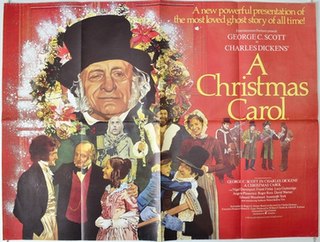
A Christmas Carol is a 1984 British-American made-for-television film adaptation of Charles Dickens' A Christmas Carol (1843). The film was directed by Clive Donner, who had been an editor of the 1951 film Scrooge, and stars George C. Scott as Ebenezer Scrooge. It also features Frank Finlay as Marley's ghost, David Warner as Bob Cratchit, Susannah York as Mrs. Cratchit, Angela Pleasence as the Ghost of Christmas Past, Edward Woodward as the Ghost of Christmas Present and Roger Rees as Scrooge's nephew Fred; Rees also narrates portions of Charles Dickens' words at the beginning and end of the film. The movie was filmed in the historic medieval county town of Shrewsbury in Shropshire.

Bugs Bunny's Christmas Carol is an eight-minute animated film produced by Warner Bros. Television and DePatie–Freleng Enterprises, and aired on CBS on November 27, 1979 as the first segment of the Christmas special, Bugs Bunny's Looney Christmas Tales.

A Christmas Carol: The Musical is a 2004 American musical television film based on the 1994 stage musical by Alan Menken and Lynn Ahrens inspired by the 1843 novella of the same name by Charles Dickens.
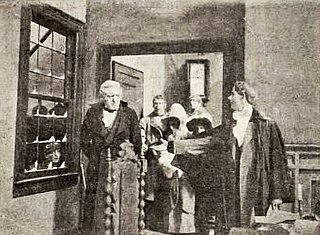
A Christmas Carol is a 1910 silent drama film directed by J. Searle Dawley and produced at Edison Studios in The Bronx in New York City. After the 1901 British release Scrooge, or, Marley's Ghost, this American version of Charles Dickens' 1843 novella is the second oldest surviving screen adaptation of the famous literary work. It features Marc McDermott as Ebenezer Scrooge and Charles S. Ogle as Bob Cratchit.

A Christmas Carol is a 1999 British-American made-for-television film adaptation of Charles Dickens' 1843 novella A Christmas Carol that was first televised December 5, 1999, on TNT. It was directed by David Jones and stars Patrick Stewart as Ebenezer Scrooge and Richard E. Grant as Bob Cratchit.
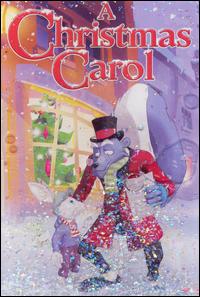
A Christmas Carol is a 2006 British-German computer-animated Christmas film. It is an adaptation of the 1843 Charles Dickens novella of the same name, and was produced by BKN International and BKN New Media, and was the first release in BKN's "BKN Classic Series" anthology of computer-animated direct-to-video films.
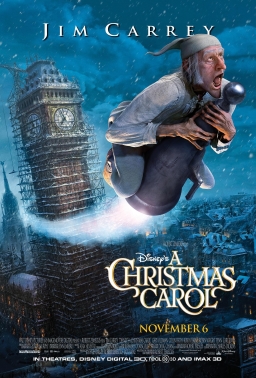
Disney's A Christmas Carol is a 2009 American animated Christmas dark fantasy film produced, written for the screen and directed by Robert Zemeckis. Produced by Walt Disney Pictures and Zemeckis' ImageMovers Digital, and released by Walt Disney Studios Motion Pictures, it is based on Charles Dickens's 1843 novel A Christmas Carol. The film was animated through the process of motion capture, a technique used in ImageMovers' previous animated films including The Polar Express (2004), Monster House (2006), and Beowulf (2007), and stars the voices of Jim Carrey, Gary Oldman, Colin Firth, Bob Hoskins, Robin Wright Penn and Cary Elwes. It is Disney's third adaptation of the novel, following Mickey's Christmas Carol (1983) and The Muppet Christmas Carol (1992).
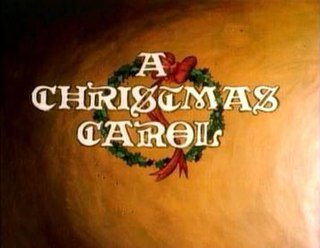
A Christmas Carol is an Australian made-for-television animated Christmas fantasy film from Burbank Films Australia as part of the studio's series of Charles Dickens adaptations from 1982 to 1985. It was originally broadcast in 1982 through the Australian Nine Network. Based on Charles Dickens' classic 1843 English story, A Christmas Carol, the adaptation by Alexander Buzo was produced by Eddy Graham and directed by Jean Tych.

Scrooge is a 1935 British Christmas fantasy film directed by Henry Edwards and starring Seymour Hicks, Donald Calthrop and Robert Cochran. The film was released by Twickenham Film Studios and has since entered the public domain. It was the first sound film of feature length to adapt the Charles Dickens novella A Christmas Carol, and it was the second cinematic adaptation of the story to use sound, following a now-lost 1928 short subject adaptation of the story. Hicks stars as Ebenezer Scrooge, the skinflint who hates Christmas and is visited by a succession of ghosts on Christmas Eve. Hicks had previously played the role of Scrooge on the stage regularly, starting in 1901, and in a 1913 British silent film version.
Scrooge is a 1913 British black and white silent film based on the 1843 novella A Christmas Carol by Charles Dickens. It stars Seymour Hicks as Ebenezer Scrooge. In the United States it was released in 1926 as Old Scrooge. It was directed by Leedham Bantock.
"A Christmas Carol" is the December 23, 1954 episode of the hour-long American television anthology variety series, Shower of Stars. The episode is an adaptation of Charles Dickens' 1843 novella of the same name.
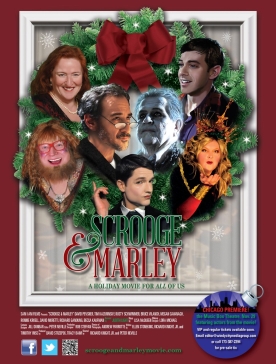
Scrooge & Marley is 2012 film adaptation of Charles Dickens' 1843 novella A Christmas Carol, which is retold from a gay perspective, co-directed by Richard Knight Jr. and Peter Neville, and co-written by Knight, Ellen Stoneking, and Timothy Imse. It also features David Pevsner as Ebenezer "Ben" Scrooge, Tim Kazurinsky as the ghost of Scrooge's business partner Jacob Marley, Ronnie Kroell as the Ghost of Christmas Past, Megan Cavanagh as the Ghost of Christmas Present, David Moretti as Bob Cratchit, and JoJo Baby as the Ghost of Christmas Future. The film adaptation received a mixed critical reception.

A Christmas Carol is a 2019 British dark fantasy drama miniseries based on the 1843 novella by Charles Dickens. The three-part series is written by Steven Knight with Tom Hardy and Ridley Scott among the executive producers. It began airing on BBC One in the U.K. on 22 December 2019 and concluded two days later on 24 December 2019. Prior to this, it aired in the U.S. on FX on 19 December 2019, with all three episodes shown consecutively as a single television film.
A Christmas Carol is a 2020 British Christmas drama dance film directed by Jacqui Morris and David Morris and based on Charles Dickens' 1843 novella A Christmas Carol. It features the voices of Simon Russell Beale, Siân Phillips, Carey Mulligan, Daniel Kaluuya, Andy Serkis, Martin Freeman and Leslie Caron. It received mixed reviews from critics.

Scrooge: A Christmas Carol is a 2022 animated musical fantasy comedy drama film directed by Stephen Donnelly from a screenplay by both Donnelly and Leslie Bricusse, adapted from the 1970 film Scrooge, in turn based on the 1843 novel A Christmas Carol by Charles Dickens. Produced by Timeless Films, the film features the voices of Luke Evans, Olivia Colman, Jessie Buckley, Jonathan Pryce, Johnny Flynn, James Cosmo and Trevor Dion Nicholas. It was released in select theaters on November 18, 2022, and made its streaming release in Netflix on December 2 of the same year. The film is dedicated to Bricusse, who died a year before the film's release. The film received mixed reviews from critics.

A Christmas Carol; or, Past, Present, and Future is a play in three acts by Edward Stirling at the Adelphi Theatre in London on 5 February 1844. Containing songs especially written for the show, the drama was adapted from the novella A Christmas Carol by Charles Dickens which had been published just weeks before in December 1843. By February 1844 eight other adaptations had already appeared on the London stage, including A Christmas Carol, or, the Miser's Warning! by C. Z. Barnett, which had opened at the Surrey Theatre in February 1844. Stirling's version, however, was the only production to be sanctioned by Dickens, who gave permission for the adaptation in January 1844.
















